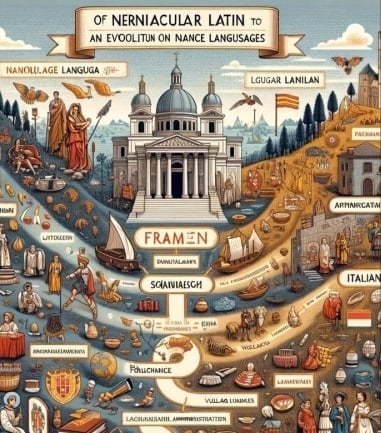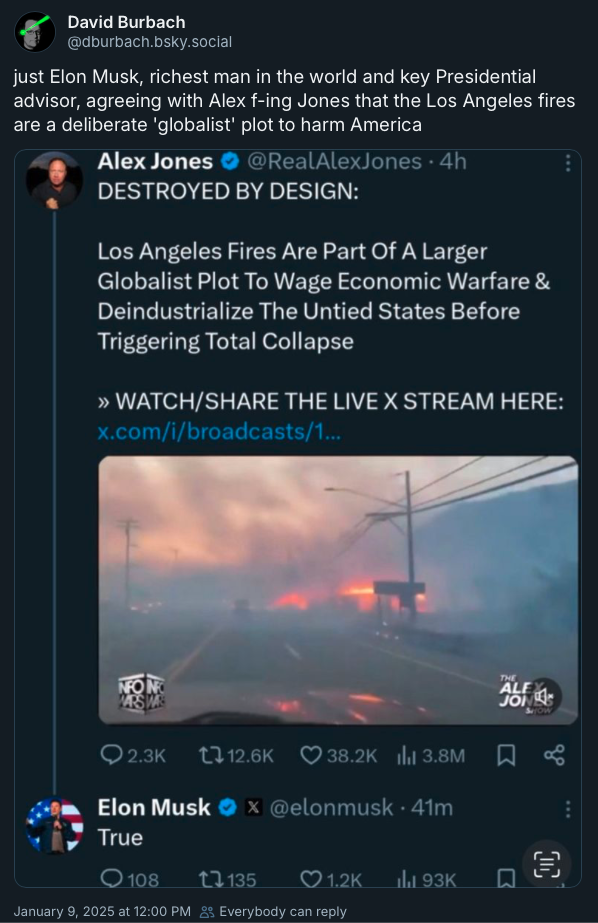Our nightmare world of AI slop
Before I get to the column this week, a brief word.
Los Angeles is on fire. Thousands of homes and businesses are gone. Many thousands of Angelenos are displaced. It's hard to grasp the scale of it all. One way to help is to donate directly to families who have suffered losses:
Thanks to friends at WFMU I've learned about this sheet: Support the Music Community – Fire Loss.
Many individual families are asking for help on GoFundMe. (If the list is overwhelming, you can give to John Chavez, a friend of DJs at WFMU who lost his home.)
Other groups helping include World Central Kitchen and Pasadena Humane.
And if you live in LA and are affected by the fires, here's a resource list.
Thanks for your generosity. Now for this week's column.
Our nightmare world of AI slop
Of Nerniacular Latin to an Evoolitun on Nance Langusages is the banner text emblazed on the cover of a new UCLA textbook. UCLA has proudly announced that its comparative literature class will use all AI-generated materials. (Details here.)

Meantime, a new class of music - or more accurately, "extruded musical product" - is spreading on Google's YouTube. These are AI-generated tunes, like I Love Pushin' People Over in the Supermarket, which features the eternal lines:
I'll push you into milk or cheese or bread or ham or eggs or butter
or dog food or canned food or broccoli, shoes or garden supplies, or anything . . .
I just love people pushin' people over so they fall and bonk their heads
I love pushin' people over into cartons of milk
These are just two of the many examples of AI-generated slop oozing into every corner of our lives - into education, music, media, and so on.
I'll admit that the "pushin' people" song has a kind of absurd charm. But that's the exception. Sturgeon's Law states that "90% of everything is crap," a percentage way too low for AI slop. The vast, vast majority of this stuff is worthless at best, and actively harmful at worst, given the tremendous energy and water it requires.
A Washington Post article (Sep 18, 2024) describes the "hidden environmental costs of using AI chatbots." One trivial example gives a sense of the scope: generating a 100-word email with ChatGPT uses up half a liter of water. If one in ten working Americans generated an email once a week, it would equal the water usage of the state of Rhode Island for a day and a half. Just for a stupid auto-generated email.
And yet it's here. AI is likely to be with us for the foreseeable future - until, I suppose, the data centers expand enough to cause rolling brownouts and water rationing, which is when people might wake up and start questioning whether it's worth turning our entire economy into a sluice for AI sludge.
In the meantime, what small percentage of AI is actually good? And how do we distinguish it from the ocean of slop? Those were the questions I dove into on Techtonic this week, a live in-studio conversation with WFMU station manager Ken Freedman:
See playlist with links and listener comments
After discussing the UCLA textbook and the "pushin' people" song, we play some truly awful AI-generated music, and then we listen to AI-generated "podcasts" spat out by Google's NotebookLM. (Ever want to hear a robot discuss Kant's Critique of Pure Reason? Take a listen.)
The last song we listen to is The Momus from Mnezhige Thistle, a song built with AI by Henry Lowengard, under his band name Large Language. The song sits in an uncanny zone that vaguely resembles - it's hard to pin down - perhaps a Scandinavian children's Christmas TV special? The music is like an abstract impressionist painting that evokes its subject without quite detailing it. I vote for this bizarre song counting as a creative, and good, use of AI.
Bros bonked on the head
Ken's and my conclusion, having listened to the range of AI slop and songs, is that "AI is good for some things." But not everything, as the tech bros would have us believe. And AI is certainly not good when it's deployed by those who are both powerful and seem to have been, shall we say, bonked on the head a few too many times.
Disgraced conspiracy theorist Alex Jones, now back on Twitter/X thanks to Elon Musk, posted the insane suggestion that "the LA fires are part of a larger globalist plot." To which Elon Musk replied, "True." As one user posted on Bluesky:
just Elon Musk, richest man in the world and key Presidential advisor, agreeing with Alex f-ing Jones that the Los Angeles fires are a deliberate 'globalist' plot to harm America
Here's what it looked liked:

AI can be helpful in some circumstances. But too often, whether deployed in Twitter/X's manipulation algorithms, or simply to add more slop to the media environment, AI is emerging as a danger to all of us. Timothy Burke’s essay on AI (Jan 2, 2025) puts it well:
the indiscriminate vomiting of generative AI into everything we read and view, every tool we use, every device in our homes, every technological infrastructure we operate or own, means at best an unproductive estrangement, a new mediating layer that no one, expert or otherwise, can really understand or control. A kind of techno-tinnitus, a buzzing hum of interference or diffusion.
Even more chilling is the suggestion by the tech bros that, if AI’s energy draw is accelerating climate change, then we’ll fix climate change by asking AI. I’ve started a Forum thread, AI and climate change, to discuss this misconception. The opening post quotes Brian Merchant's column yesterday, The fires are everywhere:
I’m thinking of how little progress we’ve made in addressing the root causes of the climate crisis, of course, and how adept our elites have become at kicking the can down the road. I’m thinking of how it is in vogue in Silicon Valley to argue that AI will “solve” the climate crisis. And also how, while AI is obviously not the reason wildfires reign over LA every other year, it fairly neatly embodies the ethos that got us here: A technological solution will bail us out . . . [an] argument invariably made by rich men who will be best insulated from the fallout of more and worse wildfires.
AI is good for some things. But on our current trajectory, we’re going to flood the world with slop, and waste an unthinkable amount of energy and water in the process, all to enrich a handful of men who already are not showing good judgement. A nightmare world of slop. We need to change course, and quickly.
If you’d like to be part of a community seeking better ways to live with technology, join our merry band at Creative Good.
Until next time,
-mark
Mark Hurst, founder, Creative Good
Email: mark@creativegood.com
Podcast/radio show: techtonic.fm
Follow me on Bluesky or Mastodon
🙏
P.S. Your subscription is unpaid. If you want to support my work on the newsletter, please join us at Creative Good. (You’ll also get access to our members-only Forum.)